FCO gender pay gap report 2016 to 2017
Published 18 December 2017
What is Gender Pay Gap Reporting?
Earlier this year, the Government introduced world-leading legislation that made it statutory for organisations with 250 or more employees to report annually on their gender pay gap. Government departments are covered by the Equality Act 2010 (Specific Duties and Public Authorities) Regulations 2017 which came into force on 31 March 2017. These regulations underpin the Public Sector Equality Duty and require the relevant organisations to publish their gender pay gap data by 30 March 2018 (and then annually), including mean and median gender ordinary pay gaps; the mean and median gender bonus gaps; the proportion of men and women who received bonuses; and the proportions of male and female employees in each pay quartile.
The gender ordinary pay gap shows the difference in the average hourly pay between all men and women in a workforce. A particularly high gender pay gap can indicate a number of issues. Individual calculations may help to identify what those issues are.
The gender pay gap is different to equal pay. Equal pay deals with the pay differences between men and women who carry out the same jobs, similar jobs or work of equal value. It is unlawful to pay people unequally because they are a man or a woman.
The Foreign & Commonwealth Office (FCO) supports the fair treatment and reward of all staff irrespective of gender. Our vision is for all Foreign & Commonwealth Office staff to be valued and able to contribute to the best of their abilities [footnote 1].
This report fulfils the Department’s reporting requirements, analyses the figures in more detail and sets out what we are doing to close the gender pay gap in the organisation.
This report includes data for FCO staff as well as staff from our Trading Fund (FCO Services) and Executive Agency (Wilton Park). FCO Services will also publish a separate report for its own staff. In line with legislation, staff are defined as the UK based Civil Service staff that are on our payroll. It does not include data for Local Staff or Contractors.
Who we are and what we do
The FCO represents the whole of the UK Government overseas and all parts of the UK. 29 other UK Government partners share our global platform.
Our global diplomatic network of Embassies, High Commissions, Consulates and other offices is vital in helping the UK Government achieve its international objectives. We use our knowledge of “abroad” – languages, cultures, political economy; and our diplomatic tradecraft - negotiating, influencing, policy and programme delivery to help achieve a goal of a more secure and prosperous United Kingdom.
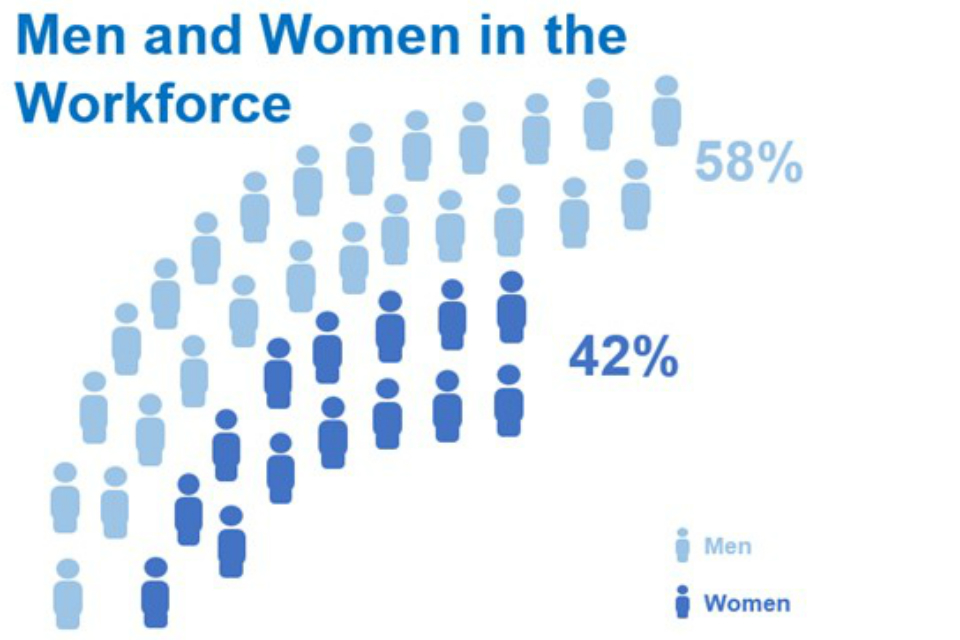
men and women in the workforce
Gender Pay Gap data
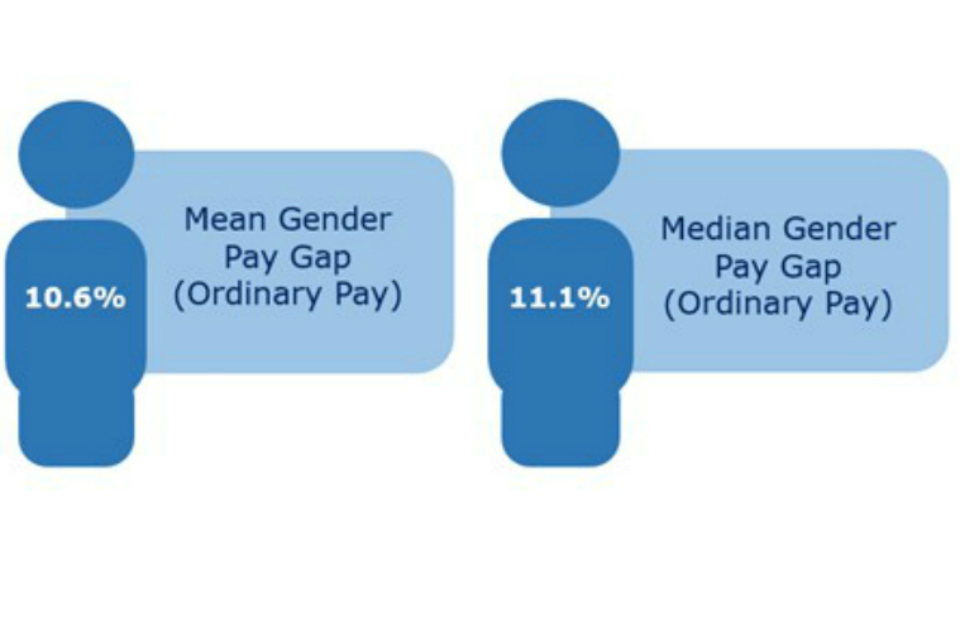
Mean gender pay gap
The mean gender pay gap is the difference between the mean “ordinary pay” for female and male employees. In the FCO, the mean “ordinary pay” for men is 10.6% higher than for women.
The median gender pay gap is the difference between the median “ordinary pay” for female and male employees. In the FCO, the median “ordinary pay” for men is 11.1% higher than for women.
Gender Pay Gap data – bonuses
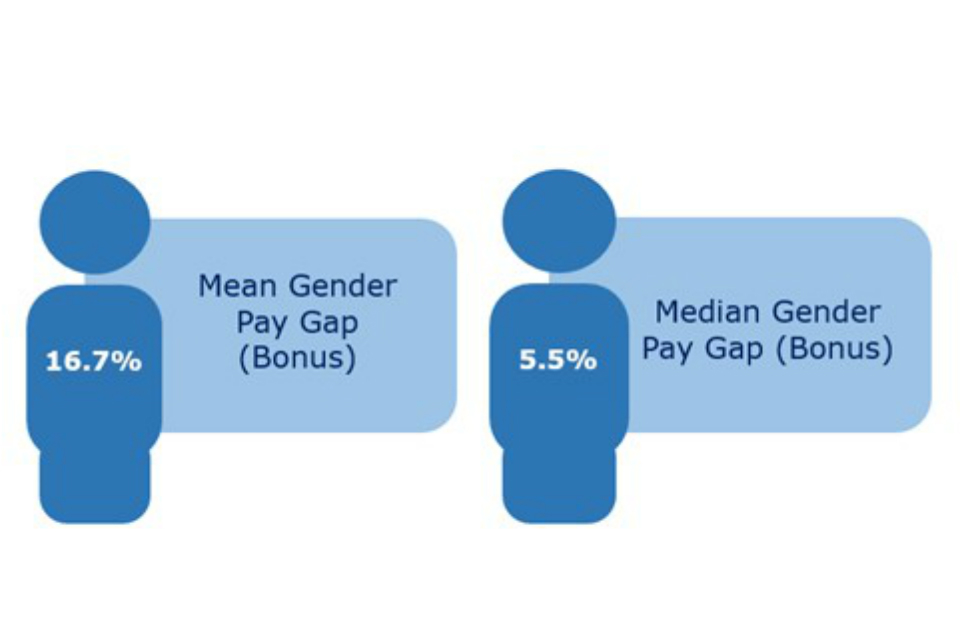
mean gender bonus
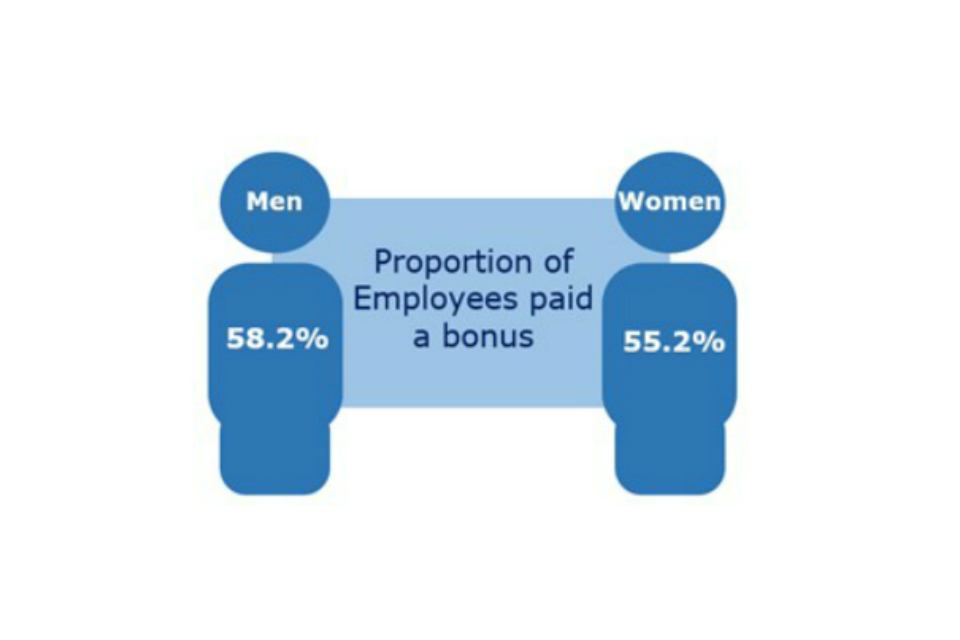
Employees bonus
Last year, the FCO paid End of Year Performance Related bonuses to 25% of its Senior Civil Service (SCS)/Senior Management Structure (SMS) staff and to 33% of its staff in the grades below the SCS/SMS (the Delegated Grades). The bonuses are fixed values depending on grade. Individual Directorates also run In Year recognition schemes to recognise specific examples of exceptional performance which contribute towards Directorate/Post objectives and/or to the corporate good. The mean bonus is 16.7% higher for men than for women and the median bonus is 5.5% higher.

Proportion of men to women
This shows the proportion of male and female staff in each pay quartile. It highlights the fact that there is a higher concentration of women in the lower pay quartile (52.4%) compared to the upper pay quartile (38.3%).
Explaining our Gender Pay Gap
Our analysis shows that the main driver behind the pay gap is that a greater proportion of women work in the junior grades (the table below sets out the gender ratio at each grade with A1 being the lowest and SMS 3 the highest). As a result, the mean and median hourly rates for women are lower. Bonuses are higher at the more senior grades (£10,080 at SCS/SMS 1 compared to £1,455 for A1). The fact that a higher proportion of male staff are in the SCS/SMS leads to the mean bonus gender pay gap (16.7%) being higher than the median (5.5%).
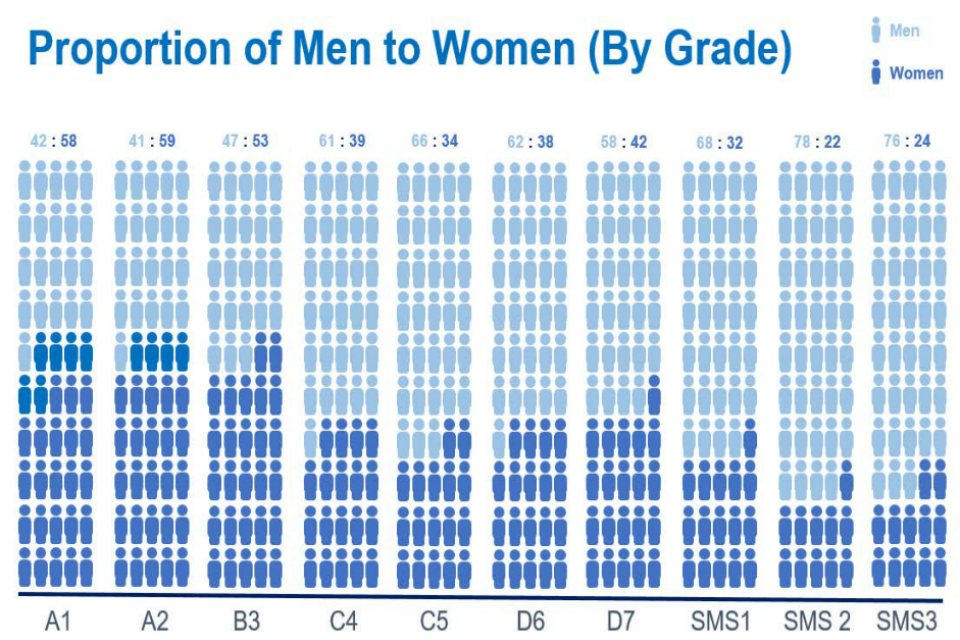
Proportion by grade
Despite the mean and median gender pay gap being 10.6% and 11.1% respectively, the gender pay gap at each individual grade is minimal:-
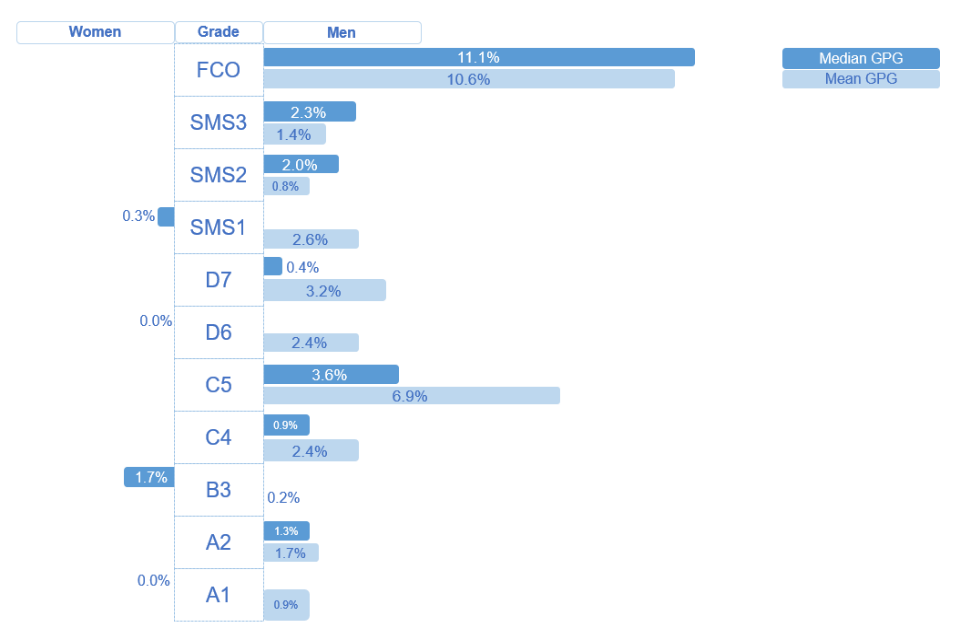
Women men
Taking Action
The FCO’s Board is committed to promoting a diverse talent pipeline: levelling the playing field by providing further support for talent from under-represented groups including women. To achieve this, the Board is working with FCO Women, a staff association that supports female employees throughout every stage of their career, to enable every woman to reach the peak of her potential. FCO Women offers mentoring and developmental opportunities, organises events and speakers, and is active on policy development.
Since March 2015, the number of women in the SCS/SMS has increased from 27% to 32%. As at the date of publication, 50% of the Board are women. The Board has set a target of 50% women among UK-based staff by 2020 and 39% women in SCS/SMS by 30 September 2019.
To deliver this, and help reduce the gender pay gap, the Permanent under Secretary (PUS) and FCO Women have agreed a 10-point gender plan, with actions aimed at supporting women to progress through the organisation. These include:
- Encouraging women to stay in the FCO and supporting leavers to return, at all grades;
- Offering mentoring and/or sponsorship to women aspiring to promotion or returning from a period of time outside the FCO, at all grades;
- Encouraging women to apply for promotion and supporting their preparation for the step up, at all grades;
- Targeted inward interchange and recruitment of women with relevant skills into the SMS;
- Supporting the work of the FCO’s staff association FCO Women;
- Offering bespoke careers advice to aspiring Band D and SMS women;
- Encouraging women to take part in talent schemes, including Civil Service wide schemes such as the Future Leaders, Senior Leaders and High Potential Directors schemes;
- Widening shortlists for Ambassador and SMS positions, and reinforce measures to reduce unconscious bias in the appointments process; and
- Conducting an external audit of our actions through gender benchmarking by NGO Business in the Community.
FCO Services will issue a separate report setting out the reasons behind its gender pay gap and what it is doing to tackle them. As a Science, Technology, Engineering and Mathematics (STEM) organisation, its main issue is how to attract and retain the best talent when the labour market is in short supply; only 9% of females in the UK work in the STEM industry.
Pay Policy
In December 2016, the FCO’s Board agreed its Workforce Strategy which provides the strategic framework and direction for the FCO workforce between 2016 and 2020. Its Pay and Benefits Principles emphasise the FCO’s commitment to offering competitive reward packages that enable us to recruit, retain and motivate staff with the skills and qualities we will continue to need to deliver the FCO’s business objectives. Ensuring equal pay for equal work is one of these principles.
We have introduced two specific pay policy changes which will help reduce our gender pay gap:-
In April 2017, we created a Senior Pay Committee to improve governance of how we remunerate our SCS and SMS staff. One of its first decisions was to change the approach for SCS/SMS bonuses so that they are the same regardless of pay band. This should reduce the mean bonus gender pay gap for future years; and
In 2016 and 2017, the FCO’s Executive Committee agreed that annual salary increases for the Delegated Grades should be determined by the level of performance and the position in the pay range. As a result, the largest increases were targeted at the best performers who were the lowest paid in each grade. This will shorten our salary ranges and so help reduce the gender pay gap.
FCO AND FCO(SERVICES) – supporting our women
Judith Gough HM Ambassador, Kyiv
I joined the Foreign Office “late” after a 6 year career as a management consultant with Ernst and Young. At the time, I was not convinced that I would be a good fit – state-school educated, non-Oxbridge and gay, I hardly fit the stereotype. But I am glad to say that my doubts were misplaced! My first role was on the Gibraltar desk, followed by a policy role on the Western Balkans where I had a stimulating on-the-job crash-course in foreign policy making. After spending some time learning Korean, I took up my first overseas posting as Political Counsellor in Seoul and found myself grappling with the DPRK nuclear issue and regional security. Upon my return to London, I drew on my private sector skills to work on corporate services and then joined the Security Policy team, leading on nuclear issues and arms control. This role took me from negotiating at the Non Proliferation Treaty Review Conference at the UN in New York to kick-starting the UK’s demining programme in the Falkland Islands.
As a Russian speaker, I was inexorably drawn to Eastern Europe and took up my first Ambassador role in Georgia in 2010 – an amazing experience in a dynamic country undergoing rapid change. I was lucky to be sponsored by the FCO during this period to complete a masters at Kings College in War Studies. Becoming pregnant, I opted to return to the UK to give birth. After maternity leave, I took the reins as Director for Eastern Europe and Central Asia. Juggling the Ukraine crisis with a small baby was a significant challenge and one that I had not foreseen! Language training following my appointment as HMA Kyiv provided a welcome respite, with flexible working enabling me to balance family and career.
My partner is able continue with her career and works remotely from Kyiv. My current role is challenging, but stimulating and rewarding. Ukraine continues to be engaged in a complex conflict with Russia, whilst working hard to reboot her economy and deliver an ambitious reform programme. We are very much at the heart of that and I am privileged to lead a diverse and talented cross-Whitehall team in Kyiv. My young sons still can’t quite work out what exactly it is that Mummy does – “talk a lot” and “have meetings” apparently… But rest assured, the life of an ambassador in the 21st century is so much more than that!
Fouzia Younis, Comms Directorate
Coming from a small town in the Midlands and as the daughter of first generation migrants from the Commonwealth, I was the first person from my family to go to university and studied at Birmingham University and Cambridge University. My story has instilled a strong desire to help others who may face similar challenges and I am passionate about diversity and inclusion issues. I am on the FCO’s BAME committee, have supported FCO diversity efforts for several years including work through the FCO Women’s Association and Religion and Faith Belief Group, and am a mentor to young people from inner city areas, supporting them to achieve their aspirations of going to university.
I have three children and now split my time between London and the Midlands (my children go to school in the Midlands and are looked after by my mum for part of the week). As a career diplomat, I have served in a wide range of diplomatic service roles including postings to Islamabad, Colombo and most recently to Dhaka where I was the UK spokesperson and led the British High Commission Communications team working on behalf of the whole of the government (including DFID, MOD and DIT).
Other roles have included a secondment to No 10 working on the NATO summit; delivering HR change programmes; and am now working as the Senior Strategic Communications Advisor on the UK Gulf Strategy delivering the PM’s vision of increasing UK engagement in the Gulf. I speak three languages and am part of the Government Communications Service profession. My work has been shortlisted for FCO staff awards.
Rebecca Brigden, Business Services Director for FCO Services
FCO Services provides secure building, estates and construction as well as protective security and secure logistics to the Foreign and Commonwealth Office (FCO). I am responsible for leading a wide range of business functions within Secure Global Services from the Professional and Technical Services Centres, Translating and Interpreting and Logistics to Central and Commercial teams.
After studying for a joint degree in electromechanical engineering at the University of Southampton, I joined the FCO 18 years ago as a C5 (SEO) M&E Engineer to work on the Millennium Bug project. FCO Services supported me to become a Chartered Engineer over a decade ago. I’m perhaps not what people are expecting when they hear an engineer from the Foreign Office is coming to visit. But handing over my business card with my professional qualifications means people take me seriously. I love the fact that I never quite know what my day is going to bring. You have to use your knowledge to find a pragmatic solution and ensure something works in hostile conditions — places where you can’t just go down to a hardware store to get supplies.
Married with a ten-year-old daughter, I have an incredibly supportive husband who knows I enjoy what I do. It’s not easy but I do my best to juggle, and I get home in time to put my daughter to bed. I am an active STEM Ambassador and mentor both within and outside FCO Services. FCO Services has allowed me to develop a number of different skills in a unique environment and if I can share some of that knowledge then I would be happy to do so.
-
Foreign & Commonwealth Office Diversity and Inclusion 20:20 Strategy ↩
